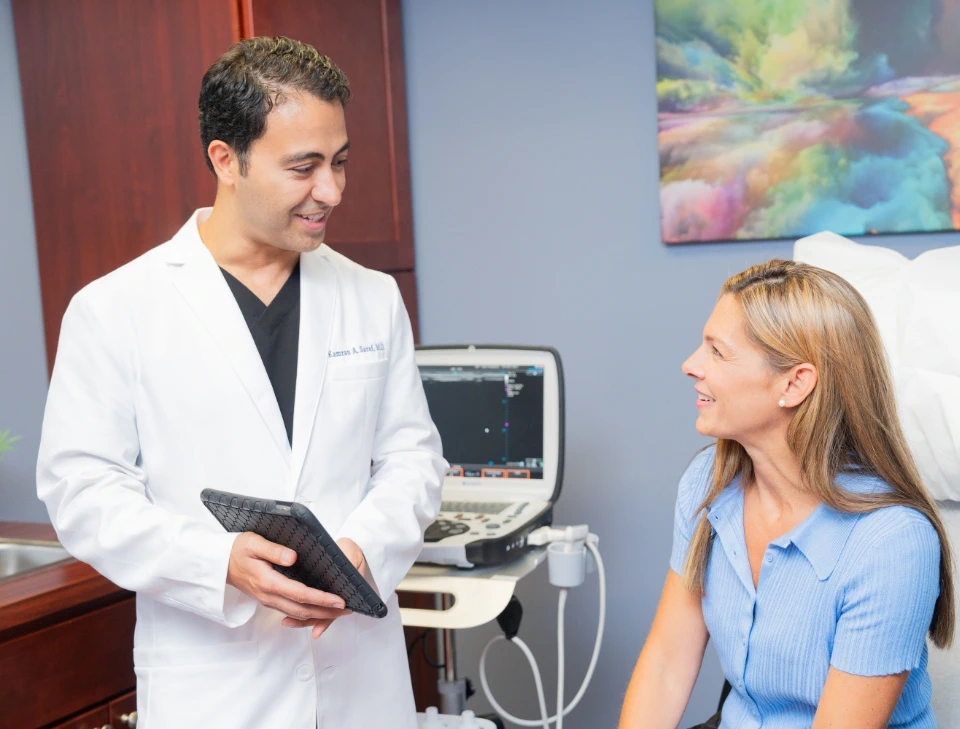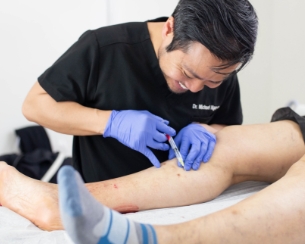Can laser treatment remove varicose veins?
Endovenous laser treatment is one of the most effective procedures for patients with varicose veins. This procedure treats the root cause of varicose veins (chronic venous insufficiency) and ensures safe, long-lasting results. To understand how endovenous laser treatment works, you need to understand how varicose veins are formed.

Introduction to varicose veins and venous insufficiency
Varicose veins are dense masses of protruding blood vessels with excess blood accumulation. Varicose veins usually occur because of chronic venous insufficiency, the root cause of most of your vein problems. Chronic venous insufficiency is a medical condition caused by collapsed vein valves, the components responsible for ensuring smooth blood circulation to the heart. When your vein valves collapse, blood flows backward because of gravity and accumulates in the leg veins, eventually leading to vascular dilation and the formation of varicose veins.
Endovenous laser treatment and ambulatory phlebectomy
During endovenous laser treatment, the vein doctor makes a small incision on the skin’s surface to insert a specialized laser fiber into the diseased vein under ultrasound guidance. Once the laser fiber is lodged within the diseased vein, the vein doctor activates it to generate laser energy and destroy the affected vein. The diseased vein turns into hardened scar tissues eventually metabolized by the body, and the accumulated blood reroutes into healthier leg veins, restoring optimal blood circulation to the heart.

Endovenous laser ablation treats chronic venous insufficiency but doesn’t necessarily remove all the visible varicose veins. After endovenous laser ablation, the vein doctor may perform an ambulatory phlebectomy to remove varicose veins. During ambulatory phlebectomy, the vein doctor administers local anesthesia, makes small incisions on the skin’s surface, and physically extracts the unhealthy varicose veins. As such, endovenous laser ablation treats the root cause of varicose veins, preventing new veins from appearing, and ambulatory phlebectomy removes the visible varicose veins.
Schedule an appointment at our vein treatment clinics
Vein Treatment Clinic is a group of state-of-the-art vein clinics specializing in comprehensive vein treatments. Instead of simply removing the visible varicose veins, we curate a comprehensive plan to address the root cause and alleviate your symptoms, ensuring long-lasting results. We have state-of-the-art vein clinics in New York City, New Jersey, Long Island, California, and Washington DC. If you’re in the DC Metro Area, you can find our vein treatment clinic in Bethesda, Maryland. Please schedule an appointment to explore your varicose vein treatment options.
Is laser treatment effective for varicose veins?
Endovenous laser treatment is extremely effective for chronic venous insufficiency and varicose veins. In fact, endovenous laser ablation has a 98% success rate, making it one of the most effective procedures for varicose veins.
How long does it take for varicose veins to disappear after laser treatment?
After endovenous laser treatment, you should start noticing a difference in your varicose veins within one week. But it can take several weeks or months for all the varicose veins to disappear. If your vein doctor performs an ambulatory phlebectomy after endovenous laser ablation, the varicose veins will be removed immediately, so you will notice instant results. In that case, the incision marks will gradually fade away over several weeks.
Do varicose veins come back after laser treatment?
Endovenous laser ablation closes the diseased saphenous vein responsible for your vein problems, so the risk of vein disease recurrence is negligible. Once the diseased vein is removed, it can’t come back. The same varicose veins will never return. But you may develop new varicose veins if another one of your saphenous veins is damaged.
Which is the best treatment for varicose veins?
Radiofrequency ablation, endovenous laser ablation, and venaseal are considered some of the best treatments for varicose veins. Radiofrequency ablation and laser ablation involve using thermal or laser energy to destroy the diseased saphenous vein and restore optimal blood circulation to the heart. VenaSeal involves injecting a medical-grade adhesive into the diseased saphenous vein to seal it shut, rerouting the accumulated blood into healthier veins. Your vein doctor will review your medical history, examine your conditions, and recommend the best treatment for your specific needs.
What is the success rate of laser treatment for varicose veins?
Endovenous laser treatment has a 98% success rate for varicose veins. In addition to being highly effective, endovenous laser ablation has a negligible risk of complications and vein disease recurrence.
Is it worth getting varicose veins removed?
Varicose vein treatments are essential for your long-term mental and physical health. If you don’t seek varicose vein treatment, the symptoms of vein disease will continue worsening, eventually leading to skin discoloration, leg ulcers, deep vein thrombosis, burst varicose veins, and other complications. That’s why you must seek varicose vein treatment as soon as possible.
How much does it cost to have varicose veins removed privately?
The cost of varicose vein treatment depends on numerous factors, such as the location and size of varicose veins, whether you have underlying vein disease, the doctor’s fees, the cost of venous ultrasound scans, your specific treatment plan, and whether you’re eligible for insurance coverage. Our vein doctors always provide a complete breakdown of your vein treatment cost before the procedure, so you know what to expect.
Is vein removal painful?
Varicose vein removal isn’t painful because it’s performed under local anesthesia. Furthermore, veins don’t have nerve endings, so destroying the diseased vein doesn’t cause pain. After the treatment, you may have to take some medications to reduce post-treatment discomfort.









